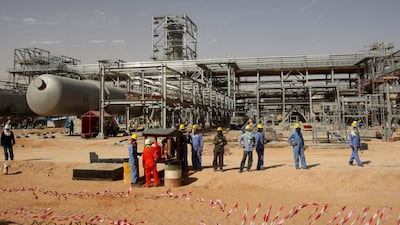Almost two years have passed since the Saudi crown prince Muhammad bin Salman intimated that Aramco was considering an initial public offering (IPO).
Since then, some more details have crystallised, including that 5 per cent of the company is up for sale, and that the IPO is a firm plan rather than an abstract possibility. Yet the IPO remains mostly mysterious, with most media reports being based on anonymous sources from within the oil behemoth, or unnamed hedge fund managers. Why is it so hard to get transparent analysis? Several factors are at play.
First, much of the background information that would usually be available in the build-up to an IPO, such as objective assessments of the company’s assets, are unavailable due to Aramco’s importance to Saudi Arabia’s national security, in an era where the kingdom faces a multitude of geo-political threats. In contrast, when a company such as the cloud storage major Dropbox considers an IPO, there are no national security concerns that retard the flow of relevant information to prospective investors.
Moreover, while oil is a very mature market, it is remains a fundamentally volatile one, meaning that even the accurate, publicly available information is difficult to analyse. This is partially due to the unpredictable nature of technological progress in the industry itself: there is a lot of uncertainty concerning shale oil, and regarding the efficiency of competing forms of renewable energy. This is reinforced by the presence of significant policy-related uncertainty: will governments ban petrol cars? Will Opec maintain discipline? Will major oil producers suffer supply disruptions caused by violent conflict? In contrast, music-streaming service Spotify operates in a sector largely free from geo-political and technological drama, affording investors much more confidence about the future trajectory of profits.
In addition to these two factors, there is the issue of purposeful misinformation by stakeholders vying for a strategic advantage. While nobody knows the precise value of Aramco - in fact a primary function of an IPO is to provide an objective estimate of the value - we can be confident that it is in the hundreds of billions of dollars, and possibly trillions, meaning that a 5 per cent share issue is big money.
Global financial markets are fiercely competitive, meaning that both buyers and sellers are constantly looking for even the smallest edge. In an IPO that is worth billions of dollars, nudging the needle in your favour can result in a huge windfall, amplifying the incentive to ensure that you get the best deal possible.
________________
Read more:
Crown prince Mohammed reiterates 2018 Aramco IPO timing
Saudi’s Tadawul is raising the stakes as it prepares for Aramco IPO
Aramco chief says lack of investment may hit oil supplies
________________
A key tool in the trader’s toolbox is misinformation. Prospective buyers will feign apathy, and project false doubts in an attempt to dissuade other, competing buyers from purchasing shares, helping to push the price down. Conversely, sellers have an incentive to circulate stories of having second thoughts because they are receiving extremely high direct offers, or because the company doesn’t really need the capital, as this helps push the price up.
This sort of posturing is completely analogous to what you experience in a local souq as you haggle over a decorative rug or a piece of jewellery: you, the buyer, pretend as if you have lots of alternative options, and that you barely even like the goods; while the seller will try hard to convince you that such quality is unavailable at a better price, and that meeting your proposed offer will render the trade unprofitable to them.
At present, other prospective IPO companies, such as Snapchat and Uber, would love to operate in a similar fashion. However, their hands are tied, relatively speaking, because they are operating in markets that are far more transparent and stable than oil. In contrast, stakeholders in the Aramco IPO have much more to work with because of the background uncertainty, the national security concerns and Saudi Arabia’s track record of secretive decision-making on many important policy issues.
Beyond the strategic misinformation emanating from those who perceive a benefit from the IPO, there are also those who oppose it and therefore wish to derail it for their own interests. Recall that a primary reason for the IPO is raising capital for the Vision 2030, a key step in securing Saudi Arabia’s economic future; consequently, the kingdom’s geopolitical rivals are likely to exploit any opportunity to impede the IPO’s progress. Moreover, there is the possibility of opposition from inside Saudi Arabia, too, since the IPO’s other primary goal is the improvement of corporate governance - a process that always creates individual losers, even if the organisation as a whole benefits. This is analogous to the disgruntlement expressed by civil servants when policymakers - including Saudi Arabia’s - announce plans to decrease government red tape.
Expect plenty more “hot air” and jockeying from investors during the next few months. The sensible course of action is to ignore most of it, and to focus on Aramco’s share price at the IPO and in subsequent trading: there is no better measure of value than what people are actually willing to pay for something, rather than what they claim they will pay.
Omar Al-Ubaydli is a researcher at Derasat, Bahrain. We welcome economics questions from our readers via email (omar@omar.ec) or tweet (@omareconomics).


